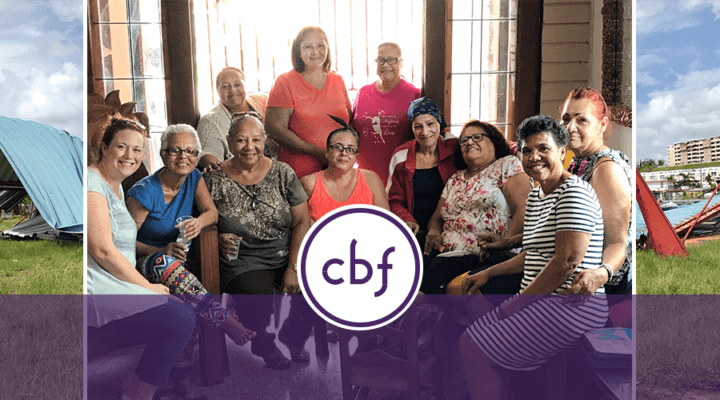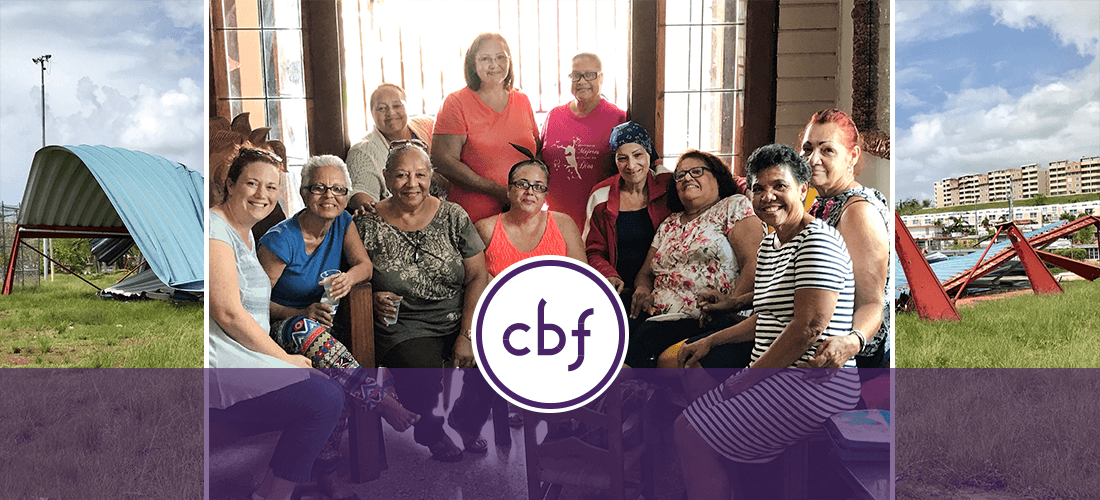By Blake Tommey
When Pastor Jesus Garcia reads news coverage of how the United States mishandled the aftermath of Hurricane Maria—a storm he and his family endured firsthand from their home in Carolina, Puerto Rico—he’s somewhat conflicted.
Yes, the American Red Cross spent less than half the money it raised to respond to Hurricane Maria. Yes, the Federal Emergency Management Agency bungled numerous contracts to companies who claimed to provide food, tarps and other aid but who never followed through. And yes, the federal government has engaged in some less-than-artful dodging of the true death toll, which may yet approach 5,000 according to Harvard researchers. But Puerto Rico is not helpless, Garcia explains; nor have its mainland neighbors abandoned it.
“When you hear people and leaders not having empathy and making comments that aren’t true, it’s frustrating,” Garcia said. “But at the same time, that gives you more strength. Our people are also accountable, and it’s not only about what the United States government can do. We all have a responsibility. We don’t have to wait for the U.S. administration. We as a people can put in the work and lift Puerto Rico up.”
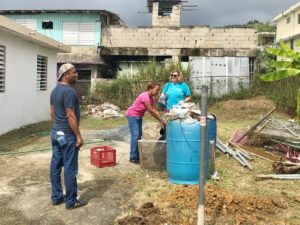
Jesus Garcia (left), pastor of Iglesia Bautista Metropolis, alongside other partners including CBF, funneled food, water filters, batteries, flashlights and funds to those in need, even traveling to remote communities to engage in repair and provide materials.
In fact, just hours after Hurricane Maria subsided in September 2017, Garcia received a phone call from close friends Randy Shepley, pastor of First Baptist Church Newport News, and Ruben Ortiz, Latino field coordinator for the Cooperative Baptist Fellowship. Garcia and his congregation, Iglesia Bautista de Metropolis (IBM), would not be alone in the debris and dismay, they promised. Two days later, CBF Disaster Response wired a $10,000 donation to Garcia and IBM to begin relief work in the communities surrounding San Juan. What’s more, CBF would soon send a leadership team to assess Puerto Rico’s most pressing needs and secure a long-term partnership for restoration.
In the meantime, Garcia and a group of local pastors rallied together to form committees, each with a unique focus such as food, health care, home safety and unmet needs. With support from CBF and other partners, they funneled food, water filters, batteries, flashlights and donated funds to those in need, even traveling to remote mountain communities to offer supplies and blue tarps for damaged roofs. Iglesia Bautista de Metropolis, which resumed Sunday worship just days after the hurricane, became one of Carolina’s primary distribution centers, offering provisions, showers and even a hot meal every Sunday afternoon. Despite those daunting first days, Garcia recalls, CBF’s swift and practical support of local teams was profoundly healing and put IBM on the cutting edge of response.
“The day after the hurricane, I didn’t know if I was going to have a church,” he said. “We didn’t have power. We didn’t have communication and it was difficult to get cell phone service. But still, I got a phone call from my friends who were not only praying for us, but sending donations. That’s one of the things I love about CBF. When there’s a need, they send the money. That put us in a very good position to help quickly. It reminded me that I’m not going to be alone. It’s going to be a hard time, but I’m not alone.”
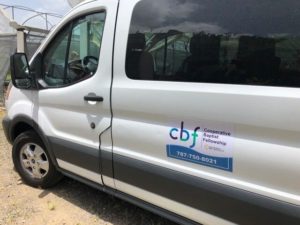
With financial support from CBF and CBF partner churches Garcia was able to purchase two new passenger vans and created a dormitory in the IBC annex to host teams from the mainland United States.
Indeed, the Category Four hurricane inflicted devastating damage on Puerto Ricans and their infrastructure. But Maria’s aftermath held worse horrors. Across the greater San Juan area, roofs and entire homes turned to treacherous rubble. Bacterial diseases hit epidemic levels. Shredded power lines lay crumpled in piles on the street. Gas station lines extended for blocks, as did lines to withdraw cash from local banks, which could no longer process credit card transactions. In turn, pharmacies lost access to health insurance records, forcing many Puerto Ricans to pay out-of-pocket for prescriptions or to forgo their medication altogether. All told, Maria’s destructive power came not only in sheer strength, but in amplifying Puerto Rico’s already critical need for economic development, Rachel Gunter Shapard, associate coordinator for Florida CBF, explained.
Consequently, CBF Disaster Response followed their initial donation with a visit to Carolina to learn about the community’s biggest priorities and to set up long-term operations with Garcia and Iglesia Bautista de Metropolis. Shapard, who accompanied the team as they toured the hurricane’s path, says CBF’s first responsibility was to listen and learn. Disaster response doesn’t exist in a vacuum, she explains. Helping a community respond to a natural disaster is no different than helping it respond to more enduring struggles of injustice or underdevelopment. The community must generate its own solutions and collective action, she says, and a partner like CBF must come alongside to resource and enlarge their capacity.
“Disaster response is so heavily tied to community development,” Shapard said.
“You’re working with those who have the least amount of resources and ability to connect with resources, because they don’t have insurance or coverage that will really help them. Our typical response, as churches and individuals, is to want quick fixes and easy answers. But if we do that, we’re not listening to members of the community, what they’re asking for and what their priority is. First and foremost, we have to be good listeners, and try to understand what a community needs most, because it’s probably different from what we see or think.”
Iglesia Bautista de Metropolis would need continual help clearing debris, repairing roofs, repainting homes and offering simple resources such as water filters and batteries for months and even years to come. That’s why CBF Disaster Response’s other primary focus was to help Garcia and IBM prepare to host volunteer groups from mainland churches, Shapard says. During their remaining time in Puerto Rico, CBFDR hosted training sessions with Garcia and his team, with a special focus on self-care and working with scarce resources. Garcia then purchased two new passenger vans and created a dormitory in their church annex, complete with a brand-new air conditioner, all thanks to donations from CBF and partner churches.
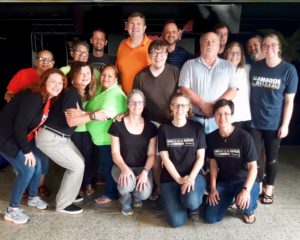
More than 23 groups from churches and universities have traveled to Carolina, Puerto Rico, with supplies and dedicated workers to replace roofs, clean debris and repair homes.
With housing, transportation and a response plan secured, CBF Disaster Response spread the word among partner churches, schools and organizations. In January, volunteer groups from across the U.S. began to arrive consecutively and didn’t break until August, Garcia said. So far, more than 23 groups from churches and universities have traveled to Carolina, Puerto Rico, with supplies and a dedicated work team to replace roofs, clear debris and repair damaged homes. Katie Gambill, a student from Winston-Salem, North Carolina, even served as a disaster response intern with Iglesia Bautista de Metropolis through Student.Church this past summer.
Randy Shepley, Garcia’s close friend and member of the CBF Missions Council, helped his congregation, First Baptist Church Newport News, ship supplies and donations to Iglesia Bautista de Metropolis immediately following the hurricane and even sent Pastor Juan Garcia as a delegate with CBF Disaster Response. Though FBC Newport News had visited Puerto Rico just before Hurricane Maria hit, Shepley says, they plan to return as CBF’s partnership with Garcia and IBM extends beyond 2018. That’s what true response means, he explains, engaging the hard work of development long after the news anchors and first responders have gone home.
“You’ve got to be ready to stay late,” Shepley said.
“There’s always another disaster that grabs the headlines. Meanwhile, folks in Puerto Rico are still suffering mightily. A lot of things are better, but they are years from being made whole again. A lot of the issues that Puerto Rico is facing right now—responding to the hurricane, the economy and other things—will be changed only by people who are willing to be there, to listen and to do what folks that live on that island need most, and that’s a long-term thing.”
Today, Jesus Garcia speaks only of gratitude for the overwhelming support that CBF and partner churches have given to Iglesia Bautista de Metropolis. That includes the brief vacation he and his wife took after a year of constant relief work and volunteer hosting. Despite that constant work, he says, Puerto Rico is still marked with blue tarps, broken traffic lights and a working class struggling to bear the tax burden as the wealthy elite flee the country. The real work of restoration has only just begun; but Puerto Ricans are leading it, he explained, and they aren’t waiting on FEMA, the American Red Cross or Donald Trump. That’s the strange grace of Hurricane Maria, he adds—the awakening and empowering of the church to step out of its doors and into the debris.
“Hurricane Maria was a tragedy,” Garcia says. “But it showed us that we have the capacity to work and lift ourselves up. It was a blessing because it helped open the doors of the church to be the church. Sometimes we close that door and don’t let people in. The hurricane pushed us to open the door and let the people come in, let change come in. The church changed to go and look out for other people.”
The Cooperative Baptist Fellowship is a Christian Network that helps people put their faith to practice through ministry efforts, global missions and a broad community of support. The Fellowship’s mission is to serve Christians and churches as they discover and fulfill their God-given mission. Learn more at www.cbf.net.

